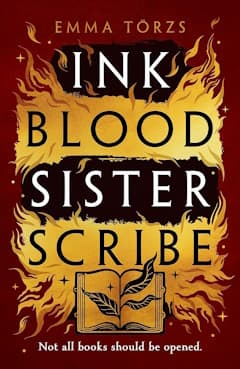
Ink Blood Sister Scribe by Emma Törzs
(William Morrow, 2023)
Reviewed by Ksenia Shcherbino
Ink Blood Sister Scribe is a love ode to books and their intrinsic magic. It is also a fantasy with elements of a thriller and has all the right ingredients for a captivating read: libraries, mirrors, dysfunctional families, powerful villains, spells, secrets and magic. There are a lot of traditional fairy tales elements that work (or don’t work) according to expectations: evil (or not so evil) stepmothers, old houses filled with magic and mirrors opening passages, magical (or not so magical helpers) along the quest, and the quest itself—a discovery of one’s true story, one’s belonging and one’s identity. There is also gun violence, mutilation and murder. In a nutshell, three narratives are tightly woven together by three main characters: two estranged step sisters, Joanna and Esther, and Nicholas, a scion of a wealthy and powerful family, all with different degrees of book-bound magical abilities and crossing their paths to uncover the secrets of their heritage and parentage.
It starts with a jolt—a man, Joanna and Esther’s father, bleeds to death, literally drunk by a book he reads, but the pace of the storytelling at first is torturously slow. All three main characters are locked in stasis of liminal experience. Joanna, after the death of her father lives alone in a house in the woods (just like a witch in a fairy tale!), taking care of the family library of magical books, protected by magical wards that let no one remember where she lives. Esther, her runaway sister, who was told by their father to always keep moving and never stay in one place for more than a year (but of course, this particular year she falls in love and decides to break her promise). Nicholas, supposedly the only living scribe who can write new spells with his blood, is locked by an overly protective uncle in a tower after a failed kidnapping cost Nicholas his eye (and almost cost him his life). It doesn’t prevent the uncle from turning the boy’s ability into a profitable business and bleeding him regularly to write spells that sell: we first meet Nicholas at a party where the host could turn water into wine.
Protection is at odds with knowledge and love. Esther’s father made her lead a life of a vagabond to protect her but left her with no chance to connect to people. Nicholas is followed by a bodyguard—yet constant bleeding makes him sickly and anaemic. Johanna renews protective wards around her house—but the same wards keep her mother away. Protection, instead of providing a safe space, is an entrapment that steals action—and life itself—from those it is supposed to shield, similar to the glass coffin in a fairy-tale that keeps the princess locked in to a dream-in-death. Joanna, Esther and Nicholas only come to experience life once the protective glass is broken and the wards are taken off. In this way they follow Turner’s rite of initiation—they are a blank space, a tabula rasa on which knowledge is to be written. For me it also explains their relative passivity—there’s a lot of running away and chasing and failed kidnappings, but very little action—for the amount of magical power that books and scribes potentially hold.
On the surface, the conflict in Ink Blood Sister Scribe is between people who see magical books as a treasure to protect, and those, who see them as “a commodity, like diamonds or oil–products to be bought and sold and killed for rather than a phenomenon to be guarded.” But it is also a conflict between people who see other people—and their lives—as a commodity to be used or traded, and those who chose to trust and love each other. No trust is easy—the books is layered with secrets kept and secrets divulged, and the truth is constantly displaced depending on whose version of the past is being played out.
Törzs engages in a guessing game with the reader by constantly delaying the denouement. Not once was my intuition led astray by a seemingly logical ending that only led to another unexpected twist. And this was also my main disappointment—after all the Bond-esque thriller action the ending was explained rather than acted, and it left me feel somewhat flat. Yet most of the threads are tied together neatly, and overall, it is worth a read.
Review from BSFA Review 22 - Download your copy here.
